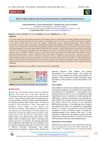 September 2023 in “SKIN The Journal of Cutaneous Medicine”
September 2023 in “SKIN The Journal of Cutaneous Medicine” Talquetamab may cause hair loss and skin issues.
 September 2023 in “Dermatology and therapy”
September 2023 in “Dermatology and therapy” Ritlecitinib effectively improves hair growth in alopecia areata patients, regardless of hair loss pattern.
 September 2023 in “Frontiers in medicine”
September 2023 in “Frontiers in medicine” The mTOR signaling pathway is crucial for hair health and targeting it may lead to new hair loss treatments.
 August 2023 in “International journal of research in Ayurveda and pharmacy”
August 2023 in “International journal of research in Ayurveda and pharmacy” Ayurveda can prevent hair fall and promote regrowth using herbs and lifestyle changes.
 August 2023 in “International Ayurvedic medical journal”
August 2023 in “International Ayurvedic medical journal” Improper diet, lifestyle, and stress are major causes of hair fall.
 July 2023 in “Dermatology and therapy”
July 2023 in “Dermatology and therapy” People with alopecia areata may have a higher risk of blood clots.
 July 2023 in “The Egyptian Journal of Hospital Medicine ”
July 2023 in “The Egyptian Journal of Hospital Medicine ” The conclusion is that emotional support and a variety of treatments are important for alopecia areata, but more research is needed.
 July 2023 in “The Egyptian Journal of Hospital Medicine ”
July 2023 in “The Egyptian Journal of Hospital Medicine ” Alopecia areata is a hair loss condition caused by immune factors and can be treated with JAK inhibitors.
 July 2023 in “bioRxiv (Cold Spring Harbor Laboratory)”
July 2023 in “bioRxiv (Cold Spring Harbor Laboratory)” The mesenchyme can start hair growth, but the exact signal that causes this is still unknown.
 June 2023 in “Dermatology and therapy”
June 2023 in “Dermatology and therapy” The Middle East and Africa need better data, treatment consensus, and support for Alopecia Areata.
 May 2023 in “Current Medicinal Chemistry”
May 2023 in “Current Medicinal Chemistry” Microneedle patches improve drug delivery for skin treatments and cosmetic enhancements.
 May 2023 in “Dermatology and therapy”
May 2023 in “Dermatology and therapy” The document concludes that identifying the cause of eyebrow and eyelash loss is key to treating it and improving quality of life.

COVID-19 may trigger or worsen rapid hair loss in alopecia areata.
 April 2023 in “Medizinische Genetik”
April 2023 in “Medizinische Genetik” New research has found 14 genes linked to the risk of developing alopecia areata, improving understanding and treatment options.

The treatment was ineffective in humans.

Inhibiting AP-1 changes skin tumor types and affects tumor cell identity.

Inhibiting AP-1 changes skin tumor types and affects tumor cell identity.
 January 2023 in “Rossijskij žurnal kožnyh i veneričeskih boleznej”
January 2023 in “Rossijskij žurnal kožnyh i veneričeskih boleznej” New treatments for child hair loss due to immune issues are effective but not yet officially approved.
 January 2023 in “International journal of homoeopathic sciences”
January 2023 in “International journal of homoeopathic sciences” The document says homoeopathic treatments are good for hair regrowth in alopecia areata but doesn't give proof.
 December 2022 in “Deleted Journal”
December 2022 in “Deleted Journal” Sheep wool keratin solution safely and effectively promotes hair growth.
 November 2022 in “International journal of pharmaceutical sciences review and research”
November 2022 in “International journal of pharmaceutical sciences review and research” Adding value and variety to herbal products helps promote them and can make India a leading exporter.
 November 2022 in “Research Square (Research Square)”
November 2022 in “Research Square (Research Square)” Keratin-associated proteins have ancient origins and were used for different purposes before being adapted for hair in mammals.
 October 2022 in “International Research Journal of Modernization in Engineering Technology and Science”
October 2022 in “International Research Journal of Modernization in Engineering Technology and Science” COVID-19 vaccines may cause hair loss in people who are genetically prone to it.

Screening for iron levels in patients with hair loss may help find a genetic iron overload condition early.
 September 2022 in “Research Square (Research Square)”
September 2022 in “Research Square (Research Square)” Increasing Rps14 helps grow more inner ear cells and repair hearing cells in baby mice.
 July 2022 in “Singapore Medical Journal”
July 2022 in “Singapore Medical Journal” Most children with alopecia areata improved with treatment, but those with more hair loss had worse outcomes.
 June 2022 in “International journal of drug delivery technology”
June 2022 in “International journal of drug delivery technology” Nebivolol cream may be a promising hair loss treatment by improving blood flow and nourishing hair follicles.
 June 2022 in “bioRxiv (Cold Spring Harbor Laboratory)”
June 2022 in “bioRxiv (Cold Spring Harbor Laboratory)” ILC1-like cells can cause alopecia areata by attacking hair follicles.
 May 2022 in “Pharmacognosy journal”
May 2022 in “Pharmacognosy journal” Moringa seed oil may help prevent hair loss and promote hair growth.

The document concludes that the development of certain tumors is influenced by genetic background and that a specific gene modification can lead to tumor regression and reduced growth.






























